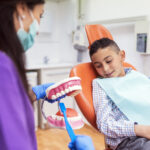Good oral care begins with choosing the right tool specifically, the toothpaste and toothbrush you use daily. With so many options available, it can feel overwhelming to pick the best products, especially if you have sensitive teeth or are shopping for children. To help you make informed choices, Dr. Payal shares expert advice on the best toothpaste for sensitive teeth, safe options for kids, ingredients to avoid, and trusted recommendations
Early intervention, also referred to as Phase 1 therapy, is advised in some situations. This often lasts for six to eight months and happens between the ages of seven and ten. The objective is to direct the growth of the jaw, provide room for arriving teeth and avoid more serious issues down the road. Phase 2 therapy may start once all permanent teeth erupt, which typically happens between the ages of 11 and 13. When most people hear the phrase “braces,” they picture straightening teeth, adjusting the bite and making the smile flawless.
Different Types of Toothbrushes: Which One is Right for You?
Manual Toothbrushes: The most common and affordable option. Effective when used with proper brushing techniques
Electric Toothbrushes: Often recommended by dentists for their superior plaque removal. They can be especially helpful for those with limited dexterity or braces
Sonic Toothbrushes: A subtype of electric brushes that use high-frequency vibrations to clean teeth thoroughly. Brands like Philips Sonicare are popular
Interdental Brushes: Small brushes designed to clean between teeth where regular brushes can’t reach
What Toothpaste is Best for Sensitive Teeth?
If you experience discomfort or sharp pain when eating hot, cold, or sweet foods, you may have sensitive teeth. This sensitivity often results from exposed dentin, enamel erosion, or gum recession. The good news is that the right toothpaste can make a significant difference
We recommend looking for toothpastes specifically formulated for sensitivity. These products typically contain ingredients like potassium nitrate or strontium chloride, which help soothe nerve endings inside the teeth and reduce sensitivity over time. Brands such as Sensodyne and Colgate Sensitive Pro-Relief have proven effective for many patients
What Toothpaste and Toothbrush Are Safe for Children?
Children have different dental care needs compared to adults, so it’s important to choose products that are both safe and effective for their growing teeth
For toothpaste using a fluoride toothpaste that is specially designed for children. Fluoride strengthens tooth enamel and helps prevent cavities, which are common in young kids. However, because young children often swallow toothpaste, it’s crucial to use a pea-sized amount and supervise brushing to prevent excessive ingestion
When it comes to toothbrushes, choose ones with soft bristles and a small head. Soft bristles are gentle on children’s delicate gums and teeth, reducing the risk of irritation or damage. Many brands offer toothbrushes designed specifically for different age groups, from toddlers to preteens, featuring fun colors or characters to encourage regular brushing
Not all toothpaste ingredients are created equal, and some may cause more harm than good. Here are a few common ingredients to watch out for: Sodium Lauryl Sulfate (SLS), Triclosan, Artificial Sweeteners and Flavors, Microbeads and Parabens
Conclusion
Taking care of your smile starts with the basics, but choosing the right toothpaste and toothbrush can have a big impact on your oral health and comfort. With these tips from Dr. Payal, you can confidently pick the products that suit your needs, whether you have sensitive teeth, are caring for children, or simply want to avoid harmful ingredients



